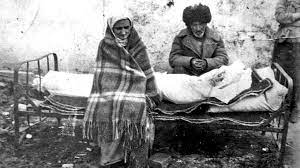Harold Chambers
Feb. 23 marks the 80th anniversary of the Soviet Operation Chechevitsa (Lentil): the deportation of the Chechen and Ingush peoples. Josef Stalin and Lavrenty Beria ordered the NKVD and military to round up the residents of the Checheno-Ingush Autonomous Soviet Socialist Republic (ASSR), whom they falsely accused of collaborating with the invading German army.
At gunpoint, they were loaded onto cattle cars and shipped to Central Asia. If the operation did not go to plan in a village, the residents were killed on the spot. In Khaibakh, villagers were burned alive in a barn because impenetrable snow made their deportation impossible. Altogether, roughly one-third of the Chechen and Ingush population perished during Operation Lentil. The deported were not allowed to return to their homelands until 1957. But even then, not everyone could. The deportations were accompanied by the dissolution of the Checheno-Ingush ASSR, and not all districts were returned to it when re-established.
The historical ripples from the deportations continue to make waves today through the legacy of Chechnya’s struggles for independence, the Kremlin’s historical revisionism, and Chechen leader Ramzan Kadyrov’s attempts to increase his power in the North Caucasus. The genocidal deportations were but the latest tragic act in a centuries-long history of Russia’s violent oppression of Chechnya. However, its recency, coupled with Yeltsin’s initial failed military excursion into Chechnya in 1992, demonstrated the Chechens’ need for their own state. At the same time, events in the Balkans, in which the West and the international community intervened, lent themselves to the Chechen argument for recognized statehood. As such, the deportations played a significant role in Chechnya’s international appeals for recognition. These appeals fell on deaf ears. From Chechnya’s declared independence to the Second Chechen War, Europe maintained that Russia’s invasion of the republic was an internal conflict. Thus, it could not intervene or engage with Chechnya without Russia’s approval. It was not until 2004 that the European Parliament recognized the deportations as a genocide.
The deportations, and later independence of Chechnya, mean that Kadyrov does not control all of the lands that belonged to the Checheno-Ingush ASSR. In addition to no longer being united with Ingushetia, North Ossetia’s Prigorodnyy district and Dagestan’s Novolakskyy district are former regions of the ASSR, to which Chechnya believes it is entitled.
Last year, the Kadyrov regime promoted a hashtag marking “100 years of Chechen statehood.” In reality, this was celebrating the creation of the Checheno-Ingush ASSR, exhibiting Kadyrov’s aspirations. The Chechen governor has frequently staked claims on Ingushetia. A secret land swap deal in 2018 disproportionately favored Chechnya, and led to mass protests in the neighboring republic. In 2021, Kadyrov attempted to take more land from Ingushetia, this time by de facto annexation.
When Ingush people objected, threatened to take all of Ingushetia by force. Interethnic tensions have flared periodically in Dagestan’s Novolakskyy district, creating a premise for Kadyrov to intervene on behalf of his ethnic kin. While Dagestani officials attempted to silence the longstanding territorial disputes, Chechen officials are continuing to serve as vocal advocates for the local population. Kadyrov has also provided humanitarian assistance to residents in regions of Dagestan he seeks to claim. While these actions are not explicit attempts to seize the region, they supplant Dagestani authority, sending a message that it is the Kadyrov regime who works for the people – this is merely posturing and does not reflect the true attitudes of local residents. Kadyrov has also tried the same strategy as in Ingushetia, but negotiations to change the borders were unsuccessful. Attempts to annex territory also failed. These failures do not mean that Kadyrov will not seek to retake the lands in the future. He has demonstrated perseverance on this matter. While the lessons from the deportation of the Chechens and Ingush 80 years ago would logically be not to commit ethnic cleansing and to stop committing violence against civilians, these have clearly been lost on Russia’s leaders. Putin’s strategy of wiping cities like Grozny off the map has been replicated in Syria and Ukraine. The installed Kadyrov regime remains responsible for the deaths of thousands of Chechens and their continued oppression.
Kadyrov will continue to utilize the memory of the deportations to extend his political power at any opportunity. As he has already demonstrated, an issue is only settled when he is satisfied. He does not yet control what he wants, so, for now, he is biding his time until he sees his next opportunity to rebuild Chechnya’s former territory.







